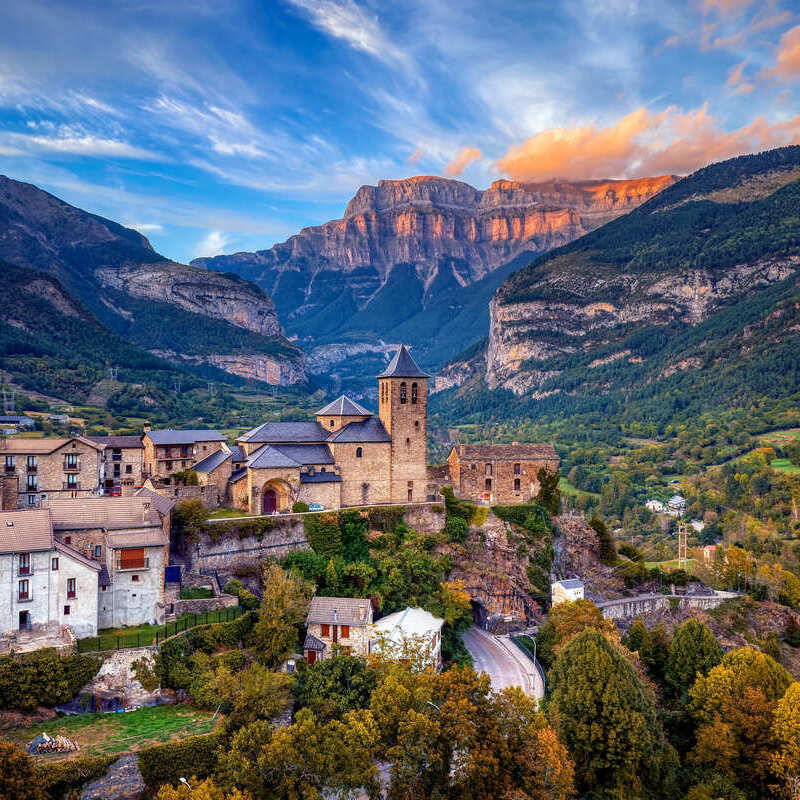Last Updated
Proving once again it is a tour de force in tourism, Spain has welcomed a whopping 79.8 million visitors throughout 2023, just short of reaching the all-time high figures it posted in 2019, making it the second most visited country worldwide.
Though it is yet to break the record it set four years ago, it is on a clear path towards full recovery, with crowds of tourists seen gathering before Barcelona’s Sagrada Familia for selfies, and beachgoers heading to Costa del Sol en masse for their sunny getaways after three years.

Spain is back to being the second most visited country worldwide, behind only France, and these are five of the main reasons why:
It Is One Of A Handful Of European Nations To Offer This Unique Combination
Europe is an incredibly diverse continent offering both nature and culture-based activities. While countries like Italy and France are highly sought-after for their ancient heritage, Norway and Switzerland have breathtaking natural sceneries for top attractions.
That’s not to say these elements are mutually exclusive, but few European countries excel at combining them the way Spain does: it is the birthplace of renowned artists like Picasso and Dali, it is where bullfighting and flamenco originated, and it lays claim to some of Europe’s top landmarks.

At the same time, the Iberian gem boasts a natural wealth like no other country in its vicinity, with coastlines on both the Atlantic and Mediterranean, a hinterland that is traversed by glorious mountains, and lush-green forests brimming with wildlife.
On the nature side, the Pyrenees range offers some of the best skiing in all of Europe, the Canaries archiepelago remain warm year-round, and island-hopping around the subtropical Balearic Islands, which include Ibiza and Mallorca, is possible as early as February.

When it comes to culture, in strolling the busy streets of Madrid, you should expect to find world-class museums housing awe-inspiring art and ornate buildings; in Barcelona, the narrow, winding streets of the Gothic Quarter are preserved examples of medieval city-building.
In Seville, Moorish influence is everywhere to be seen, owing to centuries of North African control, and the traditional Basque towns in Northern Spain are cultural manifestations of Europe’s oldest and most mysterious ethnic nation.
Spain’s tourist offer is truly limitless, and it has something to offer everybody irrespective of preferences in travel.

The Food Is Just Out Of This World.
Still somewhat in the topic of culture, it’s probably worth mentioning that Spanish cuisine plays a huge part in promoting the country on an international stage, especially when it places ninth for best cuisines in the world, as ranked by Taste Atlas.
The Kingdom of Spain is comprised of 17 autonomous regions, well distinguished for their own cooking practices, and depending on which part of the country you’re in, you are likely to sample completely different, unique dishes that are characteristic of that specific destination.

In Catalonia, it’s all about escudella, a rich stew served with pasta and minced meat and esqueixada, deliciously salted codfish; in Andalucia, the region closest geographically to North Africa, elements of Arab cuisine are noticeable, with one obvious example being pestiños:
These deep-fried pastries soaked in honey are typically Arabic in nature. Other Andalucian delicacies include gazpacho, or cold vegetable soup, and pescaíto frito, fried fish of the day; for the best seafood you’ll ever have, take a Northwest-bound train to Galicia.

Their emblematic polbo á feira and merluza a la gallega, hake fish cooked in white wine-and-vegetables-based broth are to die for, and don’t get us started on the impressive selection of homegrown wine:
Home to Ribeiro and Godellos of Valdeorras, they give their Portuguese neighbors a run for their money.
Ready To Go Off Path?
Speaking of Galicia, it is partly responsible for Spain’s Tourism Reinassance, largely thanks to its off-path appeal and uncrowded spots yet to be ruined by beach bums and the Instagram hordes.

If you’ve been following travel trends lately, you should know by now that lesser-known destinations are witnessing a boom in bookings, and as widely popular as Spain may be, there are still some key spots flying under the radar.
One of those hidden gems, the quaint cobbled city of Pontevedra, jam-packed with historical buildings, inhabited since the Roman times, and a short drive from the sandy Galician coast, is one of the most searched destinations on Google right now.

Galicia as a whole is undergoing a popularity surge, with Santiago de Compostela, the regional capital, gaining traction due to its magnificent cathedral, the last stop on the Way of Saint James pilgrimage route, and its status as a UNESCO World Heritage city.
Elsewhere in Spain, the lesser-known Canaries are becoming more popular with American tourists since nonstop flights to Tenerife were introduced back in 2021, bringing Americans closer to Spain’s forever-springtime, paradisaical islands.

Even the Andalusian hinterland, often skipped by visitors heading straight for Madrid or Barcelona, Spain’s top two tourist destinations, is now seeing a record increase in visitor numbers, being predicted to welcome over 33 million guests in 2024.
Andalusia is the land of whitewashed mountainside villages, Moorish palaces, and flamenco art.
Did You Know The Warmest Region In Europe Is In Southern Spain?
Andalusia’s importance for the Spanish tourism sector cannot be so easily overlooked. Since summer ended, it has been instrumental in keeping arrival figures high, and the explanation is rather simple.

It is the hottest region of Europe, being geographically the closest territory to North Africa and bearing the brunt of the heatwaves coming from across the azure Mediterranean. Believe it or not, Andalusia is best experienced in the off-season.
Summers and the fall are scorchingly hot, with temperatures easily hitting 122°F and higher in larger urban centers, particularly the open furnace that is Seville, and unless the prospect of sunburns and the dry heat doesn’t faze you, we would strongly recommend visiting in spring, or even winter instead.

Right now in Malaga, the gateway to Andalusia’s Sunny Coast and an ancient port littered with Roman and Moorish ruins, it’s still a pleasant 73.4°F, perfect for some sightseeing.
The beach zones in Marbella and Estepona are also perfectly warm irrespective of season, and though the Mediterranean may be colder this time of year, we would choose leisurely strolls down crowd-free, palm-lined boardwalks, sipping on tinto de verano and admiring the coastal over the chaos of the peak season any day.
Spain Is A Bargain Of A Holiday
Finally, Spain is not as expensive as you may think.

Granted, it is no Balkans or Eastern Europe, but prices across much of the country, excluding ultra-popular cities, are considerably cheaper than France’s or Italy’s and certainly more affordable than the U.S. average.
Tourists spend on average $43 on meals every day and $134 on hotels, while the total cost of a one-week trip to Spain for two people is an acceptable $2,300 (excluding flights).
Traveling on a budget – i.e., staying in hostels or low-priced guesthouses and avoiding expensive eateries – costs are reduced even further, capping at $64 per day, including accommodation and all daily expenses.

This winter, you can book the centrally-located Chinitas Urban Hostel in sunny Malaga, famous for its rooftop bar with privileged views of Malaga Cathedral, for only $26 per night or an overnight in a private room in a local guesthouse for a reasonable $35.
Feeling inspired? You can learn more about Spain and discover five incredible cities to visit in the heart of Iberia this year by reading further here.
Read More:
Top 5 Travel Insurance Plans Starting At $10 Per Week
How To Easily Earn Points For Free Travel
↓ Join Our Community ↓
The Travel Off Path Community FB group has all the latest reopening news, conversations, and Q&A’s happening daily!

SUBSCRIBE TO OUR LATEST POSTS
Enter your email address to subscribe to Travel Off Path’s latest breaking travel news, straight to your inbox.
This article originally appeared on TravelOffPath.com
Source link

